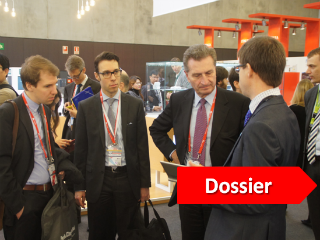From 1G to the more recently deployed 3G and 4G, with each new generation of communications networks systems connectivity becomes more prominent in our lives. And although 4G is only used by a small percentage of the world (for instance Brussels) a dream called 5G is already born!

During a pressconference at the recent Mobile World Congress in Barcelona, EU Commissioner for Digital Economy and Society, Günther Oettinger, said that Europe’s authorities have a crucial role in driving the continent’s 5G efforts.
by
N. Peter Kramer*
The rapidly growing demand for digital products and
services is vastly multiplying the amounts of data flowing through networks
worldwide.
This expansion is predicted to continue exponentially in the near
future. Mobile traffic is expected to grow by up to 1000 times over the next
decade, and this will have a tremendous impact on the underlying network
infrastructure.
There will be over 6 billion smartphone subscriptions by 2020,
and over 90% of the population over 6 years old will have a mobile phone, says
a mobility report of the Swedish technology giant Ericsson.
An expert explained the development this way: ‘4G was
designed for improving capacity, user data-rates, spectrum usage and latency
with respect to 3G. 5G is more an evolution of mobile broadband.
It will be a
key enabler of the future digital world, the next generation of ubiquitous
ultra-high broadband infrastructure that will support the transformation of
processes in all economic sectors and the growing consumer market demand’.
This evolution means that in the (near?) future also
European society and economy will strongly rely on 5G infrastructure.
The
impact will go beyond existing wireless access networks with the aim for
communication services, reachable everywhere, all the time, and faster.
5G is
also a challenge for the European IGT sector. During a pressconference at the recent Mobile World
Congress in Barcelona, EU Commissioner for Digital Economy and Society, Günther
Oettinger, said that Europe’s authorities have a crucial role in driving the
continent’s 5G efforts.
He claimed that the 5G Public-Private Partnership
‘without the European Commission and without the Commission’s "Horizon 2020" funding would not stand a chance to be a part of the game’.
Earlier on the same
day in a keynote session, Oettinger mentioned that ‘being a 5G lead adopter
requires to be a 4G leader, but Europe is still lagging behind on 4G
deployments".
The 5G PPP was initiated by European
Commissioner Ms Neelie Kroes. At the Mobile World Congress 2013 in Barcelona
she invited the industry to act: "… and today I call on EU industry and other
partners to join us in Public-Private partnership in this area.
An open
platform that helps us reach our common goal more coherently, directly and
quickly. European 5G is an unmissable opportunity to recapture the global
technological lead.
And I hope you will be able to support and join us…".
Kroes’ s call did not fall on deaf ears. A few months later the 5G PPP started.
All important players, Samsung, Alcatel-Lucent, Huawei, Ericsson, Nokia,
Telefonica, Orange and many more, joined the Commissioner.
*This
article is the first in a series for EBR webdossier ‘Digital, data and the day
after tomorrow’. Next article: ‘4G is a
success; why jumping fast to 5G?’ will follow in a few days.






